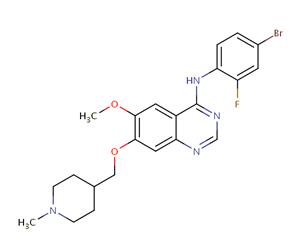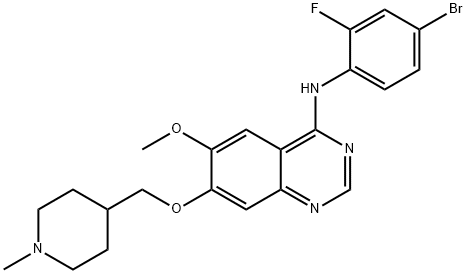Vandetanib- Application in Cancer Therapy

Figure 1. Structural formula of vandetanib
Vandetanib is a multiple signal transduction inhibitor including the RET tyrosine kinase, epidermal growth factor receptor (EGFR), vascular endothelial growth factor (VEGF) receptor (VEGFR), ERK and with antiangiogenic activity. Therefore, it has good anti-cancer activity, and furthermore it has a good application prospect in clinical applications, and then become a research hotspot in the field of biomedicine for cancer therapy.
Vandetanib is widely used in the treatment of several cancers. Especially, it is most used to treat surgically inoperable progressive medullary thyroid carcinoma (MTC). It is reported that vandetanib is well-tolerated in patients with advanced medullary thyroid carcinoma (MTC). Park et.al. found that although the FDA-approved receptor tyrosine kinases inhibitors, vandetanib and cabozantinib, are used to treat MTC, not all patients are responsive while the disease sometimes progresses after an initial response. They pointed out that these inhibitors such as vandetanib and cabozantinib may invoke an overlapping resistance mechanism(s) in MTC cells. Notebly, vandetanib and cabozantinib increased mitochondrial membrane potential (Δψm) in drug-naïve as well as drug-resistant cells. So, given the ability of vandetanib and cabozantinib to increase Δψm, they hypothesized that these inhibitors can augment growth inhibitory effects of mitochondria-targeted carboxy-proxyl and ubiquinone by increasing their Δψm–dependent uptake/retention in MTC cells. Indeed, their in vitro and mouse xenograft data strongly support this possibility.[1]
In terms of cancer treatment, Paolo investigated the antitumor activity of vandetanib in primary anaplastic thyroid cancer (ATC) cells, in the human cell line 8305C [undifferentiated thyroid cancer (TC)] and in an ATC-cell line (AF) in their study. They found that vandetanib significantly reduced ATC cell proliferation, induced apoptosis dose-dependently, and inhibited migration as well as invasion. Furthermore, vandetanib inhibited EGFR, AKT and ERK1/2 phosphorylation and downregulated cyclin D1 in ATC cells. In 8305C and AF cells, vandetanib significantly inhibited the proliferation, inducing also apoptosis. Vandetanib significantly inhibited tumor growth and VEGF-A expression and microvessel density in 8305C tumor tissues. In conclusion, the antitumor and antiangiogenic activity of vandetanib is very auspicious in ATC, opening the way to a future clinical evaluation.
In addition, the potential of vandetanib in cisplatin-resistant neuroblastoma (NB) therapy is well. Resistance is the major cause of cisplatin treatment failure in NB. Research suggests that vandetanib was as effective as high-dose cisplatin in impairing cisplatin-resistant NB subcutaneous tumor growth. Notably, vandetanib caused less severe liver toxicity in mice compared with high-dose cisplatin. In summary, study identified vandetanib as a potential drug for cisplatin-resistant NB treatment.
References
[1] Dmytro S, Seung-Keun H, Pui-Kei W, Jong-In P. Vandetanib and cabozantinib potentiate mitochondria-targeted agents to suppress medullary thyroid carcinoma cells[J]. Cancer Biology & Therapy. 2017,18(7): 473-483.
[2] Elia G, Patrizio A, Fallahi P, et al. Vandetanib has antineoplastic activity in anaplastic thyroid cancer, in vitro and in vivo[J]. Oncology reports. 2018, 39(5): 2306-2314.
[3] Changchun L, Chao Y, Guanghui W. Vandetanib inhibits cisplatin-resistant neuroblastoma tumor growth and invasion[J]. Oncology reports. 2018,39(4): 1757-1764.
[4] Kraft, Ira L et al. Outcomes of Children and Adolescents with Advanced Hereditary Medullary Thyroid Carcinoma Treated with Vandetanib[J]. Clinical cancer research: an official journal of the American Association for Cancer Research. 2018,24(4): 753-765
You may like
Related articles And Qustion
See also
Lastest Price from Vandetanib manufacturers

US $1.00-4.00/KG2025-09-12
- CAS:
- 443913-73-3
- Min. Order:
- 1KG
- Purity:
- 99%
- Supply Ability:
- 200000KG

US $0.00/KG2025-04-21
- CAS:
- 443913-73-3
- Min. Order:
- 1KG
- Purity:
- 98%min
- Supply Ability:
- 30tons/month




